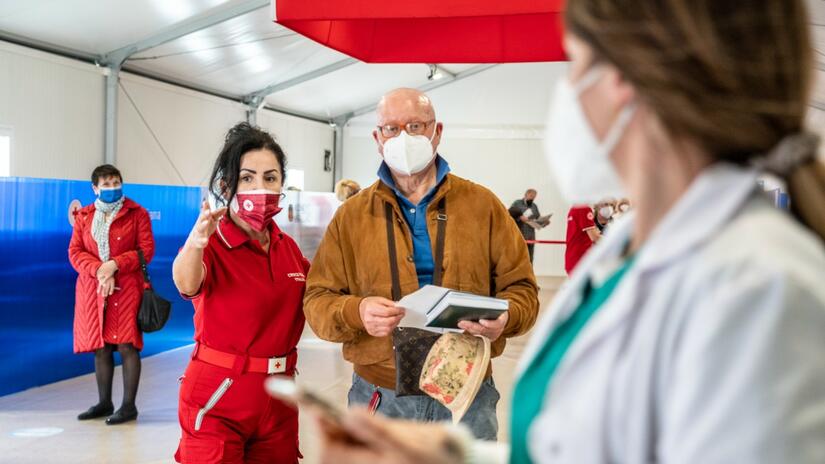Budapest/Geneva, 30 September 2021 – The International Federation of Red Cross and Red Crescent Societies (IFRC) is calling for urgent action to tackle vaccine hesitancy in Europe, where there has been a worrying increase in violent incidents against COVID-19 related health infrastructure and personnel.
The pandemic is far from over in Europe, where an average of 2,000 people die of COVID-19 every day. More than one million people get infected every week, and hospitalisations are going up in half of the EU/EEA countries, including among young people and children, but particularly among unvaccinated adults. Intensive Care Units are getting dangerously filled up in Bulgaria and Romania, for example, which have low immunisation rates.
The World Health Organization (WHO) recently projected 236,000 additional deaths linked to COVID-19 by 1 December across Europe,[i] and there are growing concerns about soaring infections and deaths in some parts of Eastern Europe, South Caucasus and Central Asia.
In addition, disinformation about vaccines’ side effects and potential risks, coupled with the introduction of ‘vaccine passes’, is sparking anger and violence, which have led to concerning incidents against medical services, media and the general public in countries including Italy, the Netherlands, the United Kingdom, Poland, Slovenia and France.
Vaccination saves lives, but there is still a deadly gap in the distribution and uptake of vaccines in the region: almost 70 per cent of people in high-income countries have received at least one dose, whereas in the poorest ones barely 20 per cent have been partially vaccinated.
Birgitte Bischoff Ebbesen, IFRC’s Regional Director for Europe, said:
“We are facing a critical moment in the fight against COVID-19 in Europe.
“Access to COVID-19 vaccination remains a challenge due to the shortage of supply in some countries. In addition, low acceptance and barriers for particularly vulnerable individuals are critical elements as well.
“Increased community engagement is needed to tackle vaccine hesitancy, myths and disinformation. Without addressing people’s concerns and fears, vaccines may not find their way into the arms of those most at risk, even where doses are available,” Ebbesen warned.
With support from the IFRC, National Red Cross and Red Crescent Societies across Europe are working to build trust. Local teams have reached out to more than 300,000 people on the importance of getting vaccinated and have helped immunise 31 million people, actively engaging communities to ensure they have accurate information and can protect themselves.
According to a survey conducted by the Collective Service for Risk Communication and Community Engagement (RCCE), of which the IFRC is a part, at least three quarters of people in most countries worldwide would agree to be vaccinated, if it was available and recommended.[ii] The data also suggests that in areas where there were high levels of hesitancy initially, increases in vaccinations overall may have impacted acceptance.
More support is needed to address vaccine hesitancy and speed up immunization campaigns across the region, though. “If we don’t step up collective efforts to strengthen community trust and make vaccines widely available, it will be too late,” stressed Ebbesen.
At the moment, IFRC’s COVID-19 Emergency Appeal[iii] is only 60 per cent funded.
For more information, please contact:
In Budapest: Ainhoa Larrea, +36 705 070 131, [email protected]
In Geneva: Teresa Goncalves, +44 7891 857 056, [email protected]
About IFRC
IFRC is the world’s largest humanitarian network, comprising 192 National Red Cross and Red Crescent societies working to save lives and promote dignity around the world.
www.ifrc.org - Facebook - Twitter - YouTube

